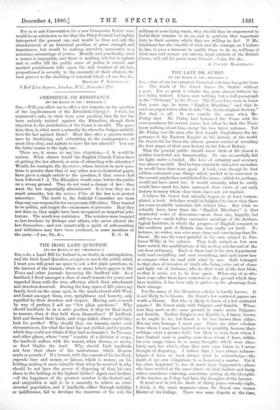OBEDIENCE, OR RESISTANCE.
[TO THE EDITOR OF THE " SPECTATOR:1
you allow me to offer a few remarks on the question of the imprisonment of the Ritualistic Clergy ? I wish, for argument's sake, to start from your position, that the law has been unfairly twisted against the Ritualists, though their objection to the jurisdiction of the Court is invalid. The ques- tion, then, is, what must a minority do, when the Judges unfairly turn the law against them? Must they offer a passive resist- ance by disobeying, and submitting to the consequences ; or must they obey, and agitate to have the law altered ? You say the latter course is the right one.
There are, it seems to me, two objections,-1. It would be useless. What chance would the English Church Union have of getting the law altered, or even of attracting wide attention? Would, for example, the Spectator, whose interest in such ques- tions is greater than that of any other non-ecclesiastical paper, have given a single article to the question, if that course had been followed P 2. The Ritualists would come before the public on a wrong ground. They do not want a change of law; they want the law impartially administered. It is true they are a small minority, but the raison d'gtre of the law is to protect minorities. The truth is, the Judicial Committee are more than any one responsible for our present difficulties. They wanted to be politic, and forgot the commonest of proverbs Had they not done so, they might have been recognised as impartial arbi- trators. The result was resistance. The resisters were branded as law-breakers by Bishops and others, who never obeyed the law themselves ; and not unnaturally a spirit of self-assertion and wilfulness may have been produced, in some members of






































 Previous page
Previous page